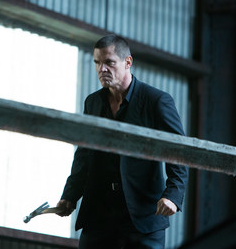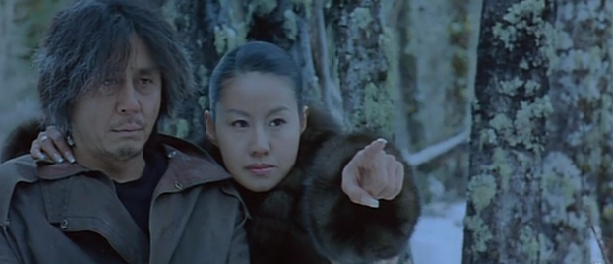Review: Oldboy (2013)
 Tuesday, November 26, 2013 at 11:59PM
Tuesday, November 26, 2013 at 11:59PM  Greetings, Dear Readers. Michael C. here. Since Nathaniel is on record as being emphatically NOT a fan of Chan-wook Park's original Cannes prize winner, I thought it fitting I, an enthusiastic Oldboy lover, would step in to review Spike Lee's hotly anticipated English language remake.
Greetings, Dear Readers. Michael C. here. Since Nathaniel is on record as being emphatically NOT a fan of Chan-wook Park's original Cannes prize winner, I thought it fitting I, an enthusiastic Oldboy lover, would step in to review Spike Lee's hotly anticipated English language remake.
One of the smallest changes to Spike Lee’s American remake of Oldboy is the most revealing. A subplot involving hypnosis has been excised from the film. No doubt the filmmakers decided mass audiences wouldn’t accept such an outlandish plot device, but therein lies the fatal error. An Oldboy that comes anywhere near plausible reality is no Oldboy at all.
Park Chan-wook’s original version pulsed with bonkers confidence, dancing on the edges of sanity, and, when need be, careening right over the cliff. In dragging the remake closer to the director’s realism comfort zone, this version has drained the story of the operatic pitch it requires.
 when you're ready for hypnosis, stare at that tree...
when you're ready for hypnosis, stare at that tree...
Spike Lee’s Oldboy is a flat and ugly thing. It keeps the violence and grotesqueries of the Korean version, but with none of the dark wit or high style that enlivened it on the first go-round. It’s obvious that Spike Lee’s heart isn’t in this.
It must be said that the premise remains irresistibly compelling. Minor embellishments aside, this new version hews closely to the structure of the 2003 film which, for those of you who still haven’t seen it, involves an alcoholic waste of a man, this time named Joe Ducett (Josh Brolin). When he is out on a bender one night instead of attending his infant daughter’s birthday party, Joe is snapped up off the street and awakens to find himself alone in a dingy motel room with no exit, no windows, and a creepy motivational sign on the wall. It is here that he will be imprisoned, without explanation, for the next decade and a half, with only a TV to keep him company. Joe keeps a tenuous grip on sanity by holding out hope of a reunion with his daughter and getting in fighting shape should the day ever arrive when he can exact revenge on those responsible for his years of solitude.
Also playing a major role is the pretty young nurse, played by Elizabeth Olsen, who crosses paths with Joe, and is surprisingly eager to drop everything she’s doing so she can help out an unstable violent stranger on his revenge quest.
Josh Brolin is a smart choice for the lead role, but his performance, like the film it's in, lacks the spark of madness that made the original so electrifying. You couldn’t take your eyes off Min-sik Choi in the 2003’s Oldboy as he ricocheted from abject suffering to grim intensity to frenzies of wild-eyed action. Brolin, on the other hand, pretty much goes straight to glum despair and sets up shop. A more believable interpretation, maybe, but hardly a more entertaining one.
Oldboy’s biggest misstep is, not coincidentally, its biggest deviation from the original, and that is its interpretation of the villain, played here by District 9’s Sharlto Copley. The antagonist in the original version was disconcerting in his banality, implacably calm and collected despite being responsible for the most elaborately depraved of schemes. In this version Copley is giving a mannered “evil” performance, chewing scenery like he’s auditioning for a job as the next Bond villain. The point of the story is supposed to be how the casual cruelties we inflict on strangers can do huge damage we never know about, damage that festers out of sight until it’s big enough and horrible enough to swallow up an entire life. When the antagonist is an over-the-top psycho Oldboy stops being about that and becomes the story of a deranged billionaire who punishes a guy out of all proportion for the crime of being an asshole in college. Not quite as resonant, I think you’ll agree.

Inside Man proved Spike could produce quality popcorn as a gun-for-hire while holding onto enough of his idiosyncrasies to deserve the label "a Spike Lee Joint". With Oldboy you get the impression Spike never figured out why he agreed to make the film in the first place, beyond the visceral kick of the story and the desire to keep busy while he tried to get his next passion project off the ground. It’s hard to imagine the audience for whom they thought they were making this film. It’s too impersonal for Spike Lee fans and too dour and gruesome for mass audiences. Fans of the original will only see the ways it doesn’t measure up whereas newcomers may wonder what all the fuss was about. It is really only of interest to those who flat out refuse to watch a film with subtitles (and those Philistines deserve what they get) and to those like myself, who watch out of duty to one of the most vital voices in movies as he marks time waiting a project more worthy of his talent. C-



Reader Comments (7)
Do they have at least a tribute to the legendary hallway fight scene?
Yes. It's pretty well executed, but like a lot of the movie it's so close to the original that it's difficult not to compare the two and find the new one lacking. I imagine if one has never seen the Korean version the hallway scene would be a high point.
.
I think it's interesting that "Oldboy" (the original) is one of the few films that smart, open-minded, friendly cinephiles will tell me that I'm flat-out wrong for not liking. Not in a rude or demeaning way but like it's a simple, definite pass/fail for film buffs. "Fight Club" is like that too. Non-fans is it like that with you too, or is it just me?
This is why I think it's kind of a shame Spike didn't think to add the racial conflict layer to this concept by making the titular "Oldboy" an African American. Say...Anthony Mackie...goes in and Lawrence Fishburne comes out and some young, under exposed black actress plays the daughter character? The rest of the cast proceeds unchanged. That would feel more like Spike Lee, right? (Plus, it would have given him an awesome rebuke to Django Unchained.)
I didn't like the original, so I'm giving this one a pass. "Giving this one a pass" being, of course, the mantra when it comes to Spike Lee movies lately.
@Volvagia
How exactly would that change the film beyond the strictly cosmetic? Not criticizing, genuinely curious.
Michael: Well, there'd need to be SOME dialogue changes to accent what the changes have done, thematically, but the hyperbolic Spike Lee race relations metaphor should be fairly easy to construct or infer out of a version of Oldboy cast that way, right? Plus, even if it's not that easy and it's just cosmetic, it's still Spike Lee and Laurence Fishburne working together on a narrative feature. (The fact that that's only happened ONCE (School Daze) is completely bizarre, especially since he's the second most important black actor working (only Denzel (because, Denzel) trumps him currently). Why second? Clean (Apocalypse Now), Swain (The Color Purple), Furious Styles (Boyz n the Hood), Ike Turner (What's Love Got to Do With It?), Morpheus (The Matrix series), Thrax (stand out stylish villain of Osmosis Jones. Stop laughing, he's best in show, easy.). Boom. Third, fourth and fifth are Samuel L. Jackson, Idris Elba (MOSTLY because of Stringer Bell) and a toss-up between Will Smith and Anthony Mackie.